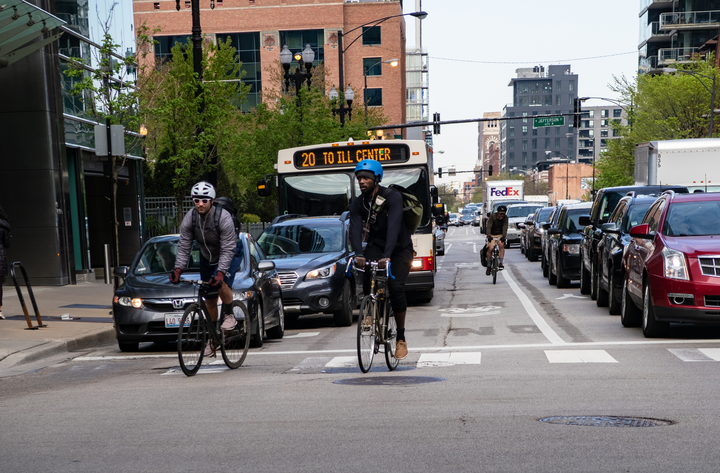A group of eight Chicago area Congressional leaders sent a strong message to Governor Pritzker and the Illinois Department of Transportation (IDOT) about how to spend newly available federal funds: factor climate change and racial equity into all of your funding decisions.
Rep. Jesús “Chuy” García led the effort behind the letter delivered to Gov. Pritzker and IDOT. It was co-signed by Reps. Sean Casten, Danny Davis, Marie Newman, Mike Quigley, Bobby Rush, Jan Schakowsky, and Brad Schneider. Active Trans and seven other regional advocacy groups provided support to the letter.
All of these leaders worked hard to develop and pass last year’s $1.2 trillion bipartisan infrastructure law. Now they want to make sure their legislation has the intended impact here at home in advancing a “progressive, equitable, and sustainable transportation system for all Illinoisans.”
Here are excerpts from the letter.
Right now, Illinois’ transportation system has many challenges. It produces the most greenhouse gasses of any sector in the state. Legacy highway infrastructure built decades ago continues to divide Latino and Black communities and subject them to harmful air pollutants. In addition, injuries and deaths on our roadways, including cyclists and pedestrians, are at their highest level in recent history.
As you implement the Bipartisan Infrastructure Law, we encourage you to align the delivery of the bipartisan infrastructure legislation with the following principles so that we can meet our shared goal of making Illinois’ transportation network the safest, cleanest, most equitable, and modern in the country:
Center Investments to Improve Racial Equity and Address Climate Change: Every project should be measured for how it will address climate change. Projects that reduce greenhouse gasses (and other air pollutants) and improve the resilience of the transportation network need to be prioritized. Transportation investments have historically disconnected Latino and Black communities from opportunity – making it more expensive and difficult to reach good jobs, education, and health care. Every project should measure the impact and benefits to low income and underrepresented communities, and projects that improve the safety and access for these populations should be prioritized for funding and completion.
Invest in Maintenance and Modernization – Not Expansion: Years of experience in the Chicago region and metro areas across the country shows highway expansion fails to achieve long-term congestion relief but instead, increases pollution and further isolates people who can’t afford or aren’t physically able to drive. The policy framework from the Federal Highways Administration (FHWA) for implementing the BIL calls for states to prioritize projects that fix existing infrastructure above projects that expand road capacity. It’s critical Illinois take this guidance to heart and reevaluate planned road expansion projects in IDOT’s Multi-Year Plan (MYP), transparently analyze the costs and benefits, and shift investment towards more efficient and effective projects.
Prioritize Transit and Active Transportation: The federal infrastructure law gives wide discretion to states to flex highway trust fund dollars from road projects to transit and active transportation projects. For decades, federal and state investments have largely ignored the needs of people who walk, bike, and ride transit. Nearly all state highways and arterial streets are unsafe and uncomfortable for people walking and biking despite connecting to many popular local destinations. These same streets lack any infrastructure to make transit more accessible, fast, and reliable. It’s essential Illinois take advantage of this opportunity to reverse course and improve compliance with the state’s Complete Streets Law by putting the needs of at-risk users such as pedestrians and cyclists first. Project types such as road diets, sidewalks, protected bike lanes, trails, bus-only lanes and bus rapid transit should be prioritized for BIL funds.

